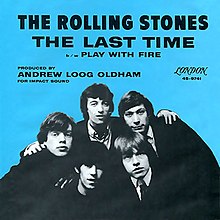
"Street Fighting Man" is a song by the English rock band the Rolling Stones, written by the songwriting team of Mick Jagger and Keith Richards. Considered one of the band's most popular and most controversial songs, it features Indian instrumentation contributed by Brian Jones, which has led to it being characterized as a raga rock song. It also features controversial and ambiguous lyrics about armed revolution. In the United States, it was released as a single in August 1968, while it was not released in the United Kingdom until four months later on the Beggars Banquet album, where it opened side two. The B-side of the American single featured "No Expectations", considered one of the final Stones tracks in which founding member Jones played a significant role in its construction.

Let It Bleed is the eighth British and tenth American album studio album by the English rock band the Rolling Stones, released on 28 November 1969 by London Records in the United States and on 5 December by Decca Records in the United Kingdom. Released during the band's 1969 American Tour, it is the follow-up to Beggars Banquet (1968), and like that album is a return to the group's more blues-oriented approach that was prominent in the pre-Aftermath (1966) period of their career. Additional sounds on the album draw influence from gospel, country blues and country rock.
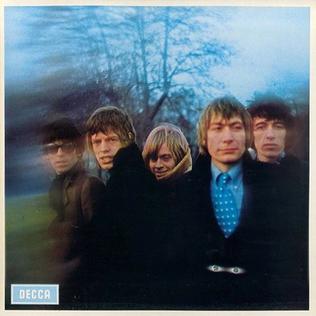
Between the Buttons is the fifth British and seventh American studio album by the English rock band the Rolling Stones, released on 20 January 1967 in the UK and on 10 February in the US. Reflecting the band's brief foray into psychedelia and baroque pop balladry during the era, the album is among their most eclectic works; multi-instrumentalist Brian Jones frequently abandoned his guitar during the sessions in favour of instruments such as organ, marimba, dulcimer, vibraphone, trumpet, and kazoo. Keyboard contributions came from two session players: former Rolling Stones member Ian Stewart and frequent contributor Jack Nitzsche. Between the Buttons would be the last album produced by Andrew Loog Oldham, who had to this point acted as the band's manager and produced all of their albums.
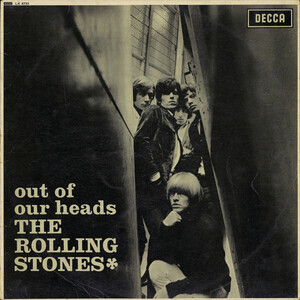
Out of Our Heads is a 1965 album by the English rock band the Rolling Stones, released in two editions with different covers and track listings. In the US, London Records released it on 30 July 1965 as the band's fourth American album, while Decca Records released its UK edition on 24 September 1965 as the third British album.

"Brown Sugar" is a song recorded by the English rock band the Rolling Stones. Written primarily by Mick Jagger, it is the opening track and lead single from their album Sticky Fingers (1971). It became a number one hit in both the United States and Canada. In the United Kingdom and Ireland, it charted at number two. In the United States, Billboard ranked it as the number 16 song for 1971.

December's Children (And Everybody's) is the fifth American studio album by the English rock band the Rolling Stones, released in December 1965. It is primarily compiled from different released tracks from across the band's recording career up to that point, including the UK version of Out of Our Heads. Bassist Bill Wyman quotes Jagger in 1968 calling the record "[not] an album, it's just a collection of songs." Accordingly, it is only briefly detailed in Wyman's otherwise exhaustive book Rolling with the Stones. It features their then-recent transatlantic hit single "Get Off of My Cloud", as well as their own remake of Marianne Faithfull's Jagger/Richards-penned hit "As Tears Go By", which was released as the album's second single in the US.

"Love in Vain" is a blues song written by American musician Robert Johnson. Johnson's performance – vocal accompanied by his finger-style acoustic guitar playing – has been described as "devastatingly bleak". He recorded the song in 1937 during his last recording session and in 1939 it was issued as the last of his original 78 rpm records.

"You Can't Always Get What You Want" is a song by the English rock band the Rolling Stones on their 1969 album Let It Bleed. Written by Mick Jagger and Keith Richards, it was named as the 100th greatest song of all time by Rolling Stone magazine in its 2004 list of the "500 Greatest Songs of All Time" before dropping a place the following year.

"Ruby Tuesday" is a song recorded by the Rolling Stones in 1966, released in January 1967. The song became the band's fourth number-one hit in the United States and reached number three in the United Kingdom as a double A-side with "Let's Spend the Night Together". The song was included in the American version of Between the Buttons.

"Lady Jane" is a song recorded by the English rock band the Rolling Stones. Written by the group's songwriting duo of Mick Jagger and Keith Richards, the song was initially included on the band's 1966 album Aftermath.
"Gimme Shelter" is a song by English rock band the Rolling Stones. Written by Jagger-Richards, it is the opening track of the band's 1969 album Let It Bleed. The song covers the brutal realities of war, including murder, rape and fear. It features prominent guest vocals by American singer Merry Clayton.

"Have You Seen Your Mother, Baby, Standing in the Shadow?" is a song by the English rock band the Rolling Stones. Written by Mick Jagger and Keith Richards, it was recorded in the late summer of 1966 during early sessions for what would become their Between the Buttons album. It was the first Stones single to be released simultaneously in both the UK and the US, and reached number five and number nine on those countries' charts, respectively.
"Ride On, Baby" is a song by English rock band the Rolling Stones. It was written by Mick Jagger and Keith Richards in 1965. It was first released as a single by Chris Farlowe in October 1966 and reached No. 31 on the British charts. The Rolling Stones' own version appeared a few months later on Flowers, an album released only in the US in June 1967. It was recorded during the Aftermath sessions in December 1965.

"Heart of Stone" is a song by the English rock band the Rolling Stones, credited to the songwriting partnership of Jagger/Richards. London Records first issued it as a single in the United States in December 1964. The song was subsequently included on The Rolling Stones, Now! and Out of Our Heads.

"The Last Time" is a song by the English rock band the Rolling Stones featuring the Andrew Oldham Orchestra, and the band's first original song released as an A-single in the UK. Written by Mick Jagger and Keith Richards, and recorded at RCA Studios in Hollywood, California in January 1965, "The Last Time" was the band's third UK single to reach number one on the UK Singles Chart, spending three weeks at the top in March and early April 1965. It reached number two in the Irish Singles Chart in March 1965, and was released on the US version of the album Out of Our Heads on 30 July 1965.
"Goin' Home" is a song recorded by the English rock band the Rolling Stones. Written by Mick Jagger and Keith Richards, it was the longest popular music song at the time, coming in at 11 minutes and 35 seconds, and was the first extended rock improvisation released by a major recording act. It was included as the sixth track on side one of the United Kingdom version and the fifth track on side two of the American version of the band's 1966 studio album Aftermath.
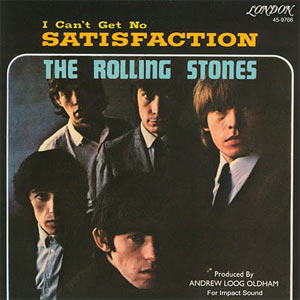
"(I Can't Get No) Satisfaction" is a song by the English rock band the Rolling Stones. A product of Mick Jagger and Keith Richards' songwriting partnership, it features a guitar riff by Richards that opens and drives the song. The riff by Richards is widely considered one of the greatest hooks of all time. The song's lyrics refer to sexual frustration and commercialism.
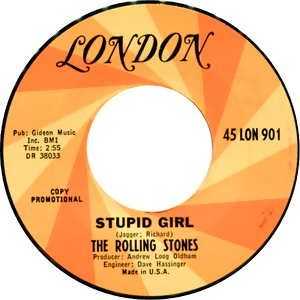
"Stupid Girl" is a song recorded by the English rock band the Rolling Stones. Written by Mick Jagger and Keith Richards, the song featured on the band's 1966 album Aftermath. It was also issued as the B-side of the U.S. "Paint It Black" single.

"Tell Me (You're Coming Back)" is a song by the English rock band the Rolling Stones, featured on their 1964 self-titled album (subtitled and often called England's Newest Hit Makers in the US). It became the first A-side single written by Jagger/Richards to be released, although not in the United Kingdom. The single reached number 24 in the United States (becoming their first top 40 hit there) and the top 40 in several other countries.
"I Am Waiting" is a song recorded by the English rock band the Rolling Stones. It was written by Mick Jagger and Keith Richards and released on the band's 1966 studio album Aftermath.
